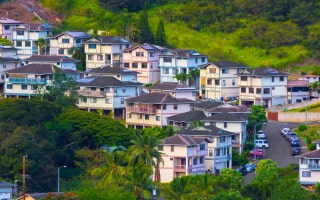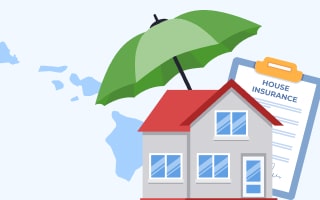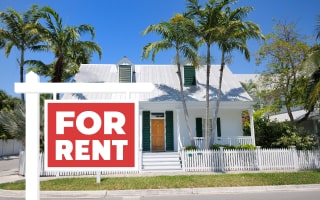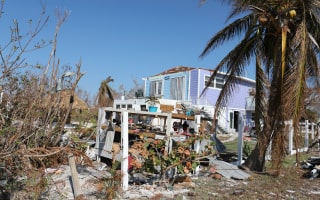Homeowners Insurance in Hawaii

Hawaii is a tropical paradise and vacation spot for many, but it also comes with some disastrous weather. Hawaii residents are subject to some of the worst weather, including hurricanes, wildfires, earthquakes, volcano eruptions, tsunamis, and landslides. Because Hawaii is made up of a series of islands, flooding is also a major concern. Since 1953, Hawaii has had 45 federally declared disasters, and the rate of disasters per 1 million people is 31.45.
Along with the myriad of natural disasters causing damage to homes, Hawaii residents also contend with fires, theft, vandalism, liability issues, and damage from falling trees or other items.
The state of Hawaii does not require any amount of homeowners insurance. However, state representatives do strongly suggest it for all homeowners. If you don't own your house outright and have to borrow money to buy it, your lender will require you to purchase and keep homeowners insurance on the property for the life of the loan. Plus, they will dictate your coverage levels, which might be more than you would choose for yourself.
According to the latest research, the national average of homeowners insurance is $2,511/year or $209/month. Hawaii residents pay roughly $1,191/year for homeowners insurance for $300,000 in coverage. That figure can vary quite a bit depending on many factors.
Types of Homeowner Insurance Coverage Available in Hawaii
Different areas of the country are subject to various perils and disasters. Therefore, insurance carriers offer different types and levels of coverage for each region of the U.S. The available types of coverage in Hawaii are:
-
Dwelling: Dwelling coverage pays to repair or replace your house if it is damaged or destroyed by a covered peril. Dwelling coverage is available in dollar limits.
-
Other Structures: Other structures insurance pays to replace or repair detached structures like fences, pools, sheds, and garages.
-
Personal Property: Personal property covers your personal belongings should they be destroyed, damaged, or stolen.
-
Liability: Liability coverage will pay your legal bills if someone gets hurt on your property and sues you.
-
Medical Payments: If someone is injured on your property, this coverage will pay their medical bills.
-
Additional Living Expenses (ALE): If you must leave the house while it is rebuilt or repaired, ALE insurance will pay for your living expenses (food, lodging, pet boarding, laundry, etc.).
Since Hawaii is made up of a series of islands, flooding is an issue. Flood insurance is special coverage, and flood damage is not covered under regular home insurance.
FEMA (Federal Emergency Management Agency) manages the National Flood Insurance Program (NFIP) through a network of 50 providers across the U.S.
Since most homeowners insurance does not cover floods, this supplemental coverage can repair damage and replace items after a flood. Depending on the options you choose, it can cover the building and/or your personal belongings. This program is available to homeowners, renters, and businesses. Learn more about the program on FEMA's website.
Home Insurance and Natural Disasters
Climate change is nothing new, but severe weather trends are continuing, and more states across the U.S. are seeing disastrous weather that damages property. These trends also negatively affect the homeowners insurance market with continuing claims and growing losses. Home insurance costs have spiked by 34% over the last five years; in some places, increases have jumped by 60%. Experts claim that 44.8% of U.S. homes will face at least one disaster, and more than half are underinsured.
Hawaii experiences many different types of disasters, including hurricanes, wildfires, earthquakes, volcano eruptions, tsunamis, and landslides. Surprisingly, Hawaii had only two billion-dollar disasters from 1980 to 2024. The average claim for wind and hail damage is $11,695. Each severe storm costs insurers an average of $10.5 billion. Fires cause much more damage and cost $77,340 per incident. Hawaii saw five wildfires in 2022, destroying 25,053 acres of land.
How Can I Save on Homeowner Insurance Premiums in Hawaii?
Homeowners insurance costs continue to rise and are affected by many factors. The main thing that affects premium prices is your location. If you live in a crime-ridden area or one prone to natural disasters, you will pay more than if you live in a quiet, safe place with very few weather incidents. Some of the other factors affecting the cost of home insurance are:
-
Age & Materials: The age of your home matters also. The older the home, the more it costs to insure it. Homes constructed of safer, more compliant materials may be cheaper to insure.
-
Coverage & Deductible: The amount of coverage is also a factor. The more coverage you need, the higher the rate. The higher your deductible, the lower the cost.
-
Credit & Claims History: If you have a lot of claims, your rates will be higher (you will be seen as a high risk); if you have good credit, your premiums will be lower.
-
Risk Factor: Your rates will be higher if you have high-risk pets or attractive nuisances.
Hawaii has some wild weather, but homeowners can minimize their home insurance costs by taking some actions such as:
- Storm Shutters: Install storm shutters to keep your windows safe during storms and reduce the number of claims and your rates.
- Reduce Risk: Remove attractive nuisances and avoid adding risks to your property.
- Bundle Policies: Bundle your homeowners insurance and auto for discounts.
- Increase Your Deductible: Increase your deductible to save on insurance.
- Replace Your Roof: Replace your roof with storm-resistant materials that comply with local building regulations.
Some other ways to save are to install security or safety equipment, don't make small claims, shop around, and make home improvements that make your home safer.
Home Insurance Discounts in Hawaii
Home insurance is a policy that protects your home should anything happen to destroy or damage it. These policies only protect against covered perils. If your house is destroyed by a fire, the insurance company will pay to replace it. Most policies include coverage for dwelling, personal property, liability, other structures, ALE, and medical payments.
You can purchase home insurance in several different ways. You can call the company's 800 number, log onto their website, apply there, or meet with a local agent. Unless you know exactly what you want, an agent might be better. They can help you determine the right coverage for your situation and budget. You must pay the first year upfront once you choose your carrier and coverage. Every year after, you will pay through your mortgage escrow (monthly) or pay an annual fee directly to the provider.
Home insurance discounts vary by provider and depend heavily on your situation. Some common discounts you might be able to take advantage of are:
- Early Quote: If you get a quote well before you need it, you could earn a discount.
- Security/Safety: If you have a security system installed, smoke alarms, sprinklers, etc., your carrier might give you a break on premiums.
- Bundles: When you bundle multiple policies with the same carrier, they usually discount your rates.
- New Home: New homes earn discounts because they were just built using stronger, more compliant materials.
- Military Discounts: Veterans or current military personnel often get discounts for their service to the country.
- Claims-Free: When you go a certain amount of time without any claims, your rates could go down automatically.
Common Rates Offer by Homeowners Insurance Firms
Your homeowner profile will drastically affect your rates. Things like your credit score, age, income, and responsibility level will come into play and can help or hurt your rates. The average cost of home insurance in Hawaii is $486/year for dwelling coverage of $300,000. New homes could be cheaper with some providers, sometimes as much as 40% less than the average.
Top 10 Home Insurance Firms in Hawaii and Average Savings for New Homes
| Company | % savings |
|---|---|
| Allstate | 47% |
| Island Insurance Hawaii | 51% |
| Atlas Insurance Agency | N/A |
| First Insurance Company | N/A |
| Cincinnati Insurance | 52% |
| Liberty Mutual | N/A |
| State Farm | 51% |
| Universal Insurance Holdings | N/A |
| PURE Insurance | N/A |
| Corebridge Financial | N/A |
Home Insurance and Renovations in Hawaii

You should know that home renovations can significantly impact your home insurance premiums. Things that reduce risk will decrease your premiums, and things that increase risk will raise them. Some upgrades have no effect at all or cancel each other out.
![]() Home Renovations that Increase Your Rates
Home Renovations that Increase Your Rates
Some home renovations that will increase your rates are:
- Finishing the Basement: Finishing a basement means adding more space, which will be more expensive to replace if your house is damaged or destroyed.
- Adding a Fireplace: Adding a fireplace can enhance the ambiance of your home but also increase the risk of a fire and your insurance rates.
- Building a Treehouse: A treehouse is seen as an attractive nuisance where someone could get hurt and produce a liability claim. As innocent as it may seem, a treehouse will increase your insurance rates.
![]() Home Renovations that Decrease Your Rates
Home Renovations that Decrease Your Rates
Some home renovations that will decrease your rates are:
- Home Security: Installing a high-end security system to keep your house safer will reduce claims for theft and vandalism and earn you lower rates.
- Plumbing/Electrical Upgrades: Replacing your plumbing or wiring could reduce your risk of water damage and fires, and your insurer might cut you a deal and lower your rates.
- Storm Resistant Materials: Installing storm shutters, hurricane straps, impact-resistant shingles, and storm-resistant windows will help keep your home safe and lower your rates.
Things like replacing your siding or adding solar panels could increase the safety of your home but may also use expensive materials and be more costly to replace, thus canceling out any savings.
Your home insurance will protect against any damage or accidents during renovations, but it will not pay for the renovations. Those are your responsibility. If you decide to make upgrades, you will have to pay for updates to your home. Insurance only covers damage and destruction due to a covered peril.
It's always a good idea to discuss any home renovations with your insurance agent before making them. Ask how it will impact your rates and anything else you should know. Make sure they reassess the home after renovations to ensure you are fully covered.
Hawaii Renters' Insurance

Renters insurance is for tenants who rent apartments, condos, and homes. It is different than homeowners insurance in that it does not cover replacement or rebuilding the dwelling itself (that is covered under the owner's policy). The main goal of renters insurance is to protect your personal belongings, liability coverage, medical payments, and loss of use (ALE). Some of the covered perils for renters insurance are:
-
Water Damage (broken pipes, etc.)
-
Fire
-
Smoke
-
Explosions
-
Theft
-
Vandalism
-
Lightning
-
Windstorms
Renters insurance pays to replace furniture, clothing, electronics, etc. However, there are limits, and expensive items might not be covered.
A few factors affect your renters insurance:
-
Location: Your rates will be higher if you live in an unsafe or high-crime area.
-
Coverage: The higher coverage limits you choose, the more your policy will be.
-
Units: The more units in your building the lower your renters insurance rates.
The average rate for renters insurance in Hawaii is $13/month or $154/year, which is very affordable compared to other states. Urban renters might pay a bit more due to the crime rate, and suburban renters will pay less.
Condo Insurance in Hawaii

Condo insurance (HO-6) is homeowners insurance for condo owners, and it works slightly differently. Although it includes dwelling coverage, it only covers the unit's interior. The condo association's master policy will cover rebuilding and restoring the condo back to its original state (when first built). Condo insurance pays for any upgrades that owners have made to the unit, like modern flooring, countertops, cabinets, fixtures, and appliances. The two policies work in tandem to restore the condo back to its current, upgraded state. No condo owner should be without condo insurance. Most associations and all lenders require it.
Unlike renters insurance, condo insurance does include dwelling (walls-in) coverage to restore the entire interior of the unit. Another difference is that liability insurance only applies to someone hurt within the unit, not outside on common grounds.
Condo insurance covers dwelling coverage (walls-in), personal belongings, liability, medical payments, loss of use (ALE), and loss assessment. Some of the things you can expect to be paid for by condo insurance are:
- Appliances
- Furniture
- Personal Belongings
- Wiring
- Plumbing
- Interior Walls
- Flooring
- Light Fixtures
- Countertops
- Cabinets
The average condo insurance rate in Hawaii is $515, far less than the national average of $1,915. Overall, condo insurance is pretty affordable in most areas.
Still, if you want to save on condo insurance, here are some tips:
- Bundle your policies together to save on rates.
- Install a security system.
- Get rid of any risks.
- Increase your deductible.
- Skip small claims and wait for anything significant.
- Keep your credit clean and work to improve your score.
Hawaii Home Insurance Market
Nationwide, the home insurance market is bleeding losses. Increased storms and violent weather events have been costly, leading to increased rates and some providers pulling out of high-risk areas. Surprisingly, Hawaii's home insurance market has remained profitable until 2023 with Maui's frequent wildfires. These fires incurred the highest losses of any state during 2023 and resulted in a catastrophic financial situation. Time will tell if that trend continues or if insurers can recoup, regroup, and stay within the market.
Hawaii has many potential disasters, such as hurricanes, wildfires, earthquakes, volcano eruptions, tsunamis, and landslides. All of these can result in losses and fewer providers, slimming the competition and making it harder for residents to insure their homes.
The home insurance industry is regulated at the state level, not federally. That means one agency within each state is responsible for ensuring that providers act ethically, fairly, and legally. The agency regulating home insurance in Hawaii is the Department of Commerce and Consumer Affairs, Insurance Division, located at King Kalakaua Building: 335 Merchant Street, P.O. Box 3614, Honolulu, HI 96813.
Homeowners Insurance Guide
- Homeowners Insurance in Hawaii
- Types of Homeowner Insurance Coverage Available in Hawaii
- Home Insurance and Natural Disasters
- How Can I Save on Homeowner Insurance Premiums in Hawaii?
- Home Insurance Discounts in Hawaii
- Home Insurance and Renovations in Hawaii
- Hawaii Renters' Insurance
- Condo Insurance in Hawaii
- Hawaii Home Insurance Market
Instant Access to Hawaii Property Records
- Owner(s)
- Deed Records
- Loans & Liens
- Values
- Taxes
- Building Permits
- Purchase History
- Property Details
- And More!
Homeowners Insurance Guide
- Homeowners Insurance in Hawaii
- Types of Homeowner Insurance Coverage Available in Hawaii
- Home Insurance and Natural Disasters
- How Can I Save on Homeowner Insurance Premiums in Hawaii?
- Home Insurance Discounts in Hawaii
- Home Insurance and Renovations in Hawaii
- Hawaii Renters' Insurance
- Condo Insurance in Hawaii
- Hawaii Home Insurance Market